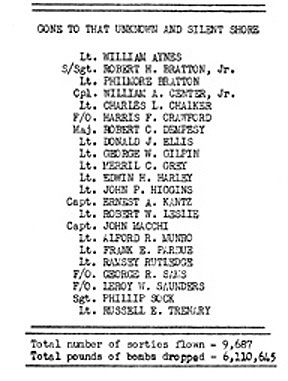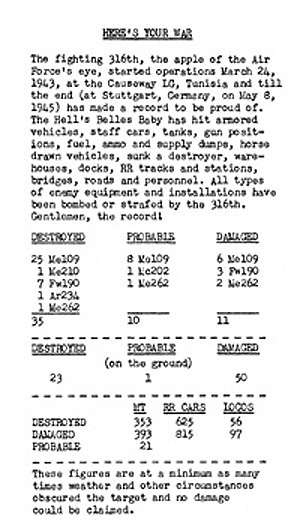I would be remiss if I did not give due credit and honorable mention to those very considerate and resourceful men, who from time to time supplemented our motor pool equipment with civilian type vehicles. At Cercola we had two cars, and old but serviceable foreign made sedan and a Ford V-8, which was re-engineered to accept a Canadian truck radiator (after unnamed person or persons tapped a stone bridge abutment with it). In France I inherited a good, front-end drive, Citroen which had been liberated for the previous Squadron Commander, Paul O'Pizzi. At Luneville, when an Army outfit moved through to the front, my Citroen disappeared. Piper Cub recce missions failed to find it. I tried a motorcycle some, but considered it too dangerous. Upon arrival in Germany a nice VW bug was liberated for me. It was fun to buzz around in. After two German mechanics, which we hired for motor pool work, overhauled the engine, it ran like a sewing machine.
One day some Army Headquarters about 50 miles away wanted a real live combat pilot to make a dinner speech; Col. Horton tagged me. In retrospect, I should have spent the night up there. On the way back darkness came early because clouds moved in. It started to drizzle rain and develop fog in patches. There hadn't been much trouble after hostilities ceased, but we still had not begun to feel safe driving the roads at night -- especially alone. So, I kept the little VW bug wide open as much as I could. There was no other traffic, so all I had to do was stay between the ditches. Some how I managed to take a wrong fork in the road, rounded a curve, and bam!
That is only word that describes the one loud short-duration noise. In the restricted visibility, I did not see the one-pole barricade until a split second before impact. I locked the brakes and was able to stop about 20 feet short of a 40-foot drop-off where a bridge had been at one time. My mind shouted, "Ambush," as I spun around and burned rubber to clear the area, but my heart thumping and the VW engine roar was the only disruption of the stillness and quiet.
It dawned on me that whoever put up the barricade had saved my life. My conscience wouldn't let me leave the road open, so I went back to the area. By flashlight I found the broken pieces of the barricade pole and supports and spliced them back together as best I could. My Bug had a helmet sized dent in the bonnet but otherwise was undamaged. Again, as on numerous occasions during the war, I had the comforting feeling that the Man Upstairs didn't want me dead yet.
Returning to the correct road, I drove with a great deal more care and caution back to Echterdingen. To complete the Bug story, just before shipping out for home I gave it to a hometown friend who was stationed nearby in an artillery outfit.
Some of our men liberated and played with a couple of gliders until one of our pilots spun in from about 50 feet and broke an ankle. Then we had to control glider flying more carefully.
Our maintenance gang went to the ME-262 factory, previously strafed by us, and brought back and assembled a beautiful 262. We found a German who taught us to start and run it up. Fortunately, I guess, Wing Headquarters got word of our bird and commandeered it before any of us were ready to try and fly it.
We bowled, rode horses, played cards and baseball, and then word came -- called a point system. It was designed to send people home mainly on the basis of how long they had been overseas. All of us except a few pilots were more than eligible, so it seemed simple enough. We had made so many Squadron moves, it would have been a snap to go home as a unit -- especially since all equipment was to be left behind. That was too simple, they had to do it to us the hard way. A few today, a few tomorrow, and so until there were very few left who knew where the toilet was. It would have been unfair to hold back the men who knew the details of what had to be done administratively; they had done all that work throughout the war. So, we said to hell with it, go home and we'll make out somehow.
It was mighty lonesome at Echterdingen after nearly all of the old timers had shipped out. I wish I could remember the names of the few who stayed. I'm sure Walt Wooten stayed on because I remember saying goodbye to him at Ft. Bragg, N. C. later.
When our personnel roster was at its lowest point another fighter outfit was moved in to take over the aircraft and ground equipment. I still do not understand why it was that way, but it seemed that the last insurmountable problem was how to get rid of Tech Supply. A young G.I. and I, on one of those lonesome days had started typing property turn-slips for items in Tech Supply. The Tech Supply trailer was loaded with a three-years' experience hardware store plus peculiar spare parts and supplies for a Squadron of P-47's and R-2800 engines.
I was trying to figure out how in the name of creation to get that job done before resurrection day, when a nice young 1st Lt. Supply type from the new outfit strolled by. The lights went on. I asked him to wait just a minute. I put a turn-in slip in the typewriter and wrote, "1 ea. Tech Supply trailer, complete with P-47 Squadron Stock." I told him to, "sign here," handed him the original, kept a copy, took my young G.I. low pointer by the arm and we got the heck out of there before the lucky Lt. learned he had just accepted at least 50,000 line items of nuts, bolts, parts, etc., probably worth a quarter million dollars.
It was a big relief to have nothing to do except travel back to the U.S.A. home and wait for orders. It was a long slow week before we found out how we would travel. Too much time to think, I guess, because I kept thinking about the letters I had tried to write to parents of pilots who had been killed in combat or accidents. I don't know if it was Air Corps policy or just the custom of our Group, but Squadron Commanders were supposed to write to parents of anyone who was lost. Fortunately there were not too many letters I had to write. I felt I had done a good job at all of my military duties, but I never found a way to tell a mother and father that their son was a hero, but had given his life for his country. I tried to say sincerely that every one of us in the Squadron shared the grief and would miss the person too, knowing full well that these attempts at condolence could not lessen the feeling of loss.
I was ahead in poker until the boxcar trip to Amsterdam. Those high stakes high/low games took all my winnings by the time that crazy miserable WW I type boxcar ride was over.
A few of us were lucky enough to be ordered home from Amsterdam by air. From V.E. Day, 8 May to Camp Shanks, N. Y. 7 Nov., 1945, was a long six months. Seems to me that there were not over ten of us there for the turn over of Squadron records, etc. We turned in everything except our socks and cleared out for home as fast as possible.


Copyright © 1979, 1983, 1985, 2002. 316th Fighter Squadron Association. All rights reserved.
© 2014 Design by ByteBabble, built with ZURB Foundation 5.